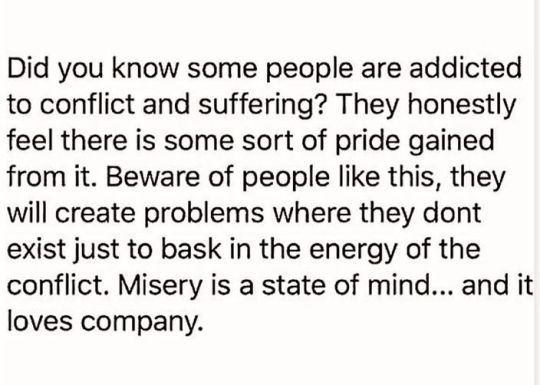Text
“There’s a difference between loving the idea of someone and loving the person they really are.”
— Unknown
663 notes
·
View notes
Text

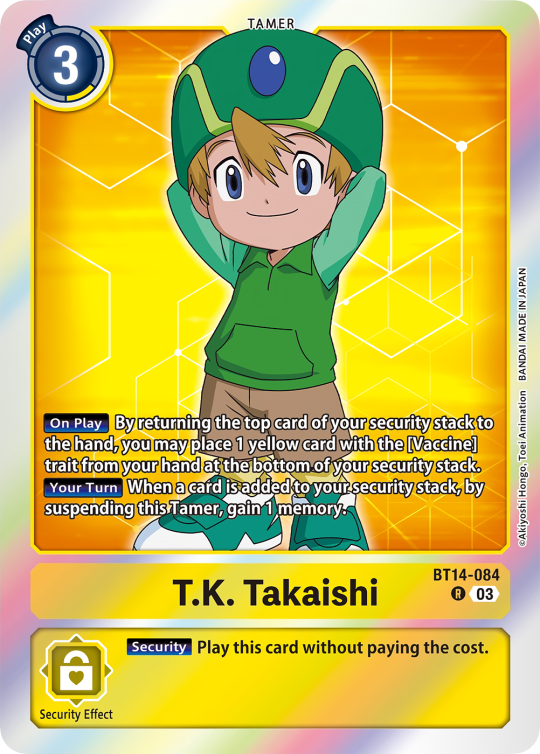
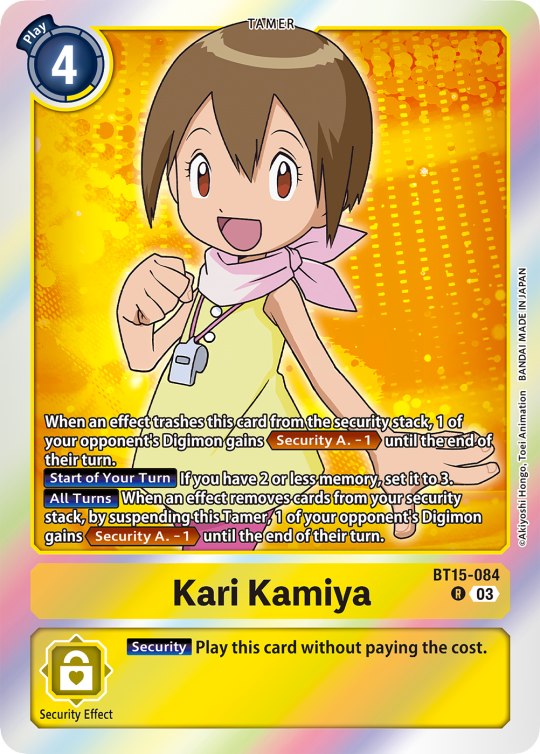
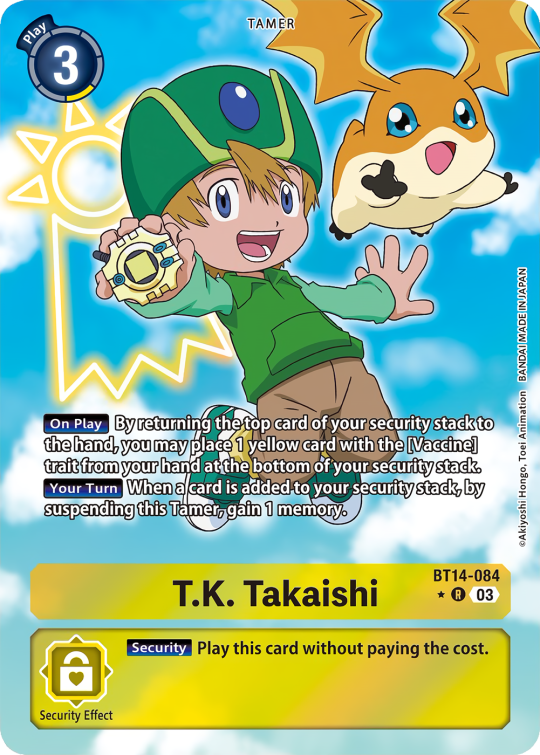


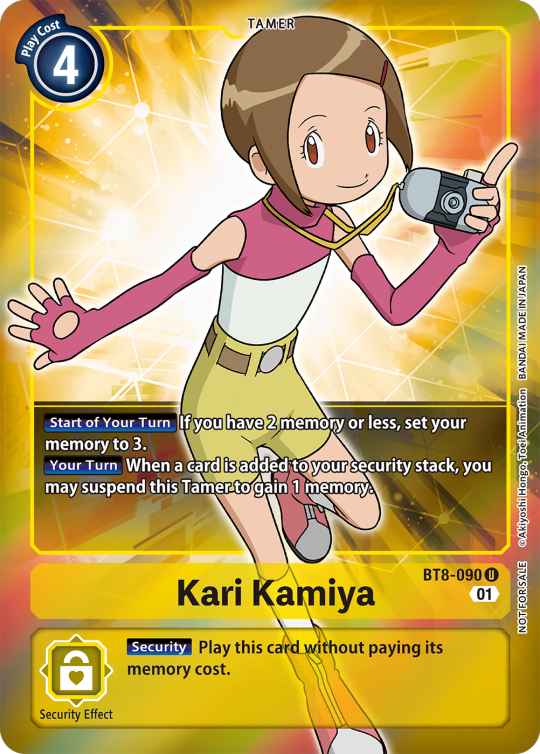
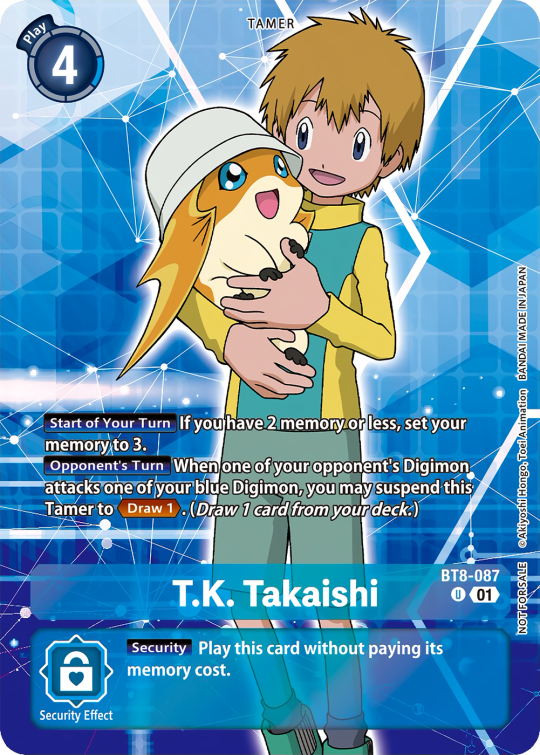
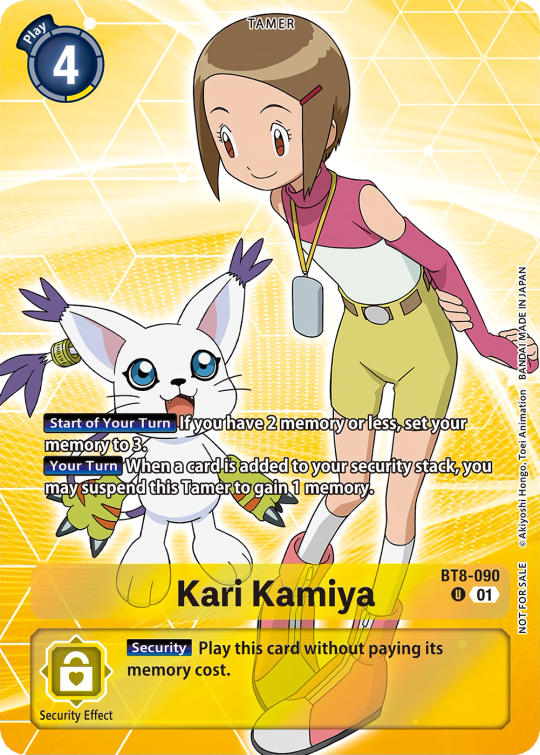

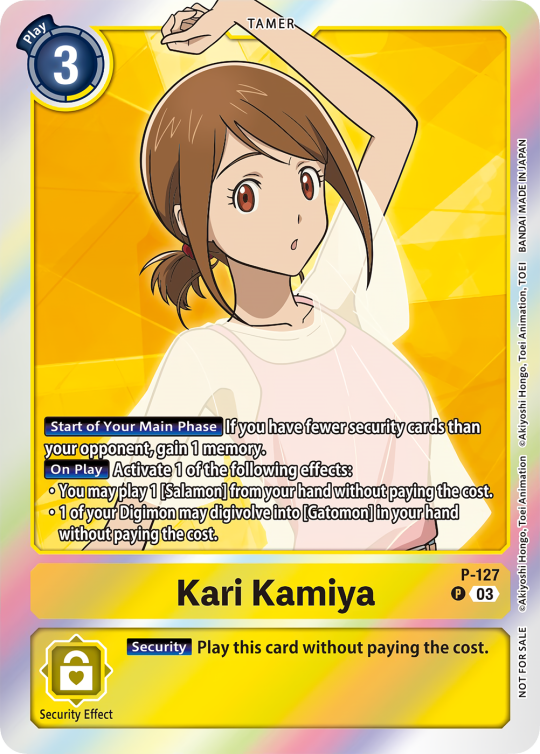



Takeru/T.K. Takaishi & Hikari Yagami/Kari Kamiya EX6-063, BT14-084+Alt, BT15-084+Alt, BT8-087,+Alt BT8-090+Alt, P-129+Alt, P-127+Alt and BT6-089 Alt Art
#impeccable framing#as always#takari#takeru takaishi#hikari yagami#official art#anime#digimon#queuetastic
155 notes
·
View notes
Text

August 1st, 2023
143 notes
·
View notes
Text

You are free to take a moment to consider how you might conserve your energy right now. - Morgan Harper Nichols
42 notes
·
View notes
Text
What is the highest number of notes on a post you have made? What's your most "successful" post?
5K notes
·
View notes
Text
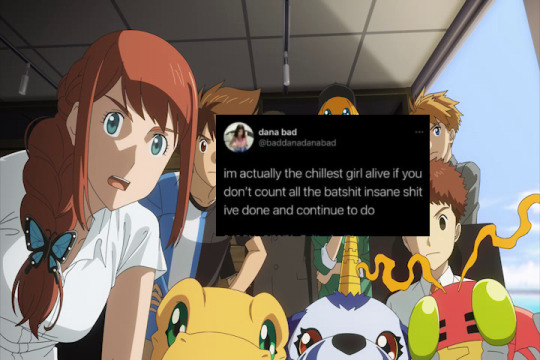
#true#menoa bellucci#anime#digimon#digimon adventure#digimon adventure last evolution kizuna#queuetastic
46 notes
·
View notes
Note
Hi! I just want you to know that I love reading your Digimon Adventure analyses. They’re so well thought out and they make me happy to see that people are still analyzing it 25 years later.
Ooooooh. :') Thank you so much for these kind words, anon. I tend to really dive deep into my fandoms. Football had been the previous hyperfocus topic for me, so my followers - if they're still around, that is - may remember my rambles back then. Now that I've been obsessed with Digimon Adventure since early 2021, I have so much fun digging deeper into the series I have known since I was 9... So even though I know a lot of things have been discussed countless times already, I enjoy giving it my own thoughts, so... I am happy people are actually enjoying my rambles and that I'm not just shouting into the void, haha.
May you have a wonderful day, anon!
2 notes
·
View notes
Text
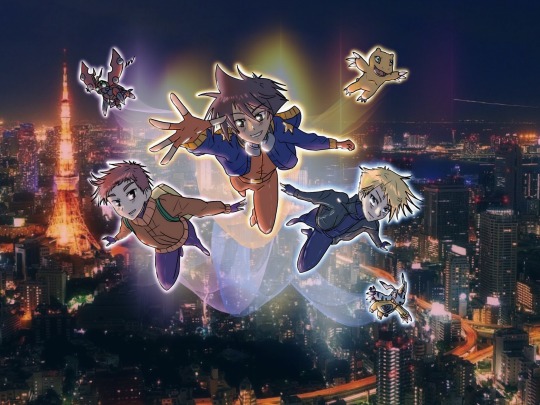
What do you mean, there will be a new season of Totally Spies and it's STILL not about the Three-Braincell-Squad???
17 notes
·
View notes
Text
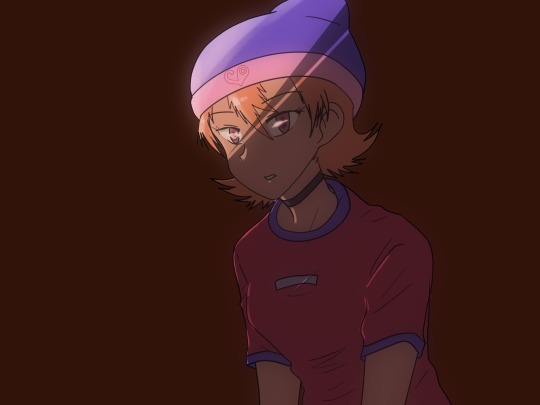
In honour of the new official illustrations; being a Chosen Child isn't easy.
30 notes
·
View notes
Text

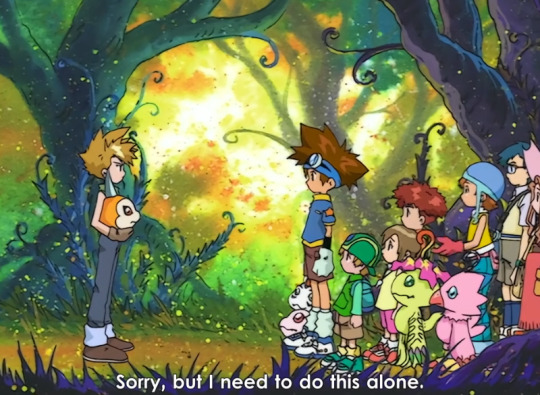
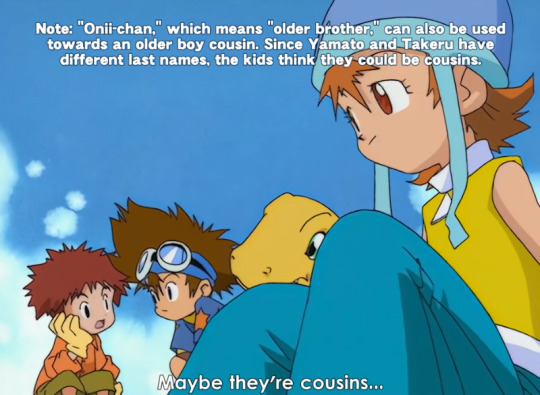
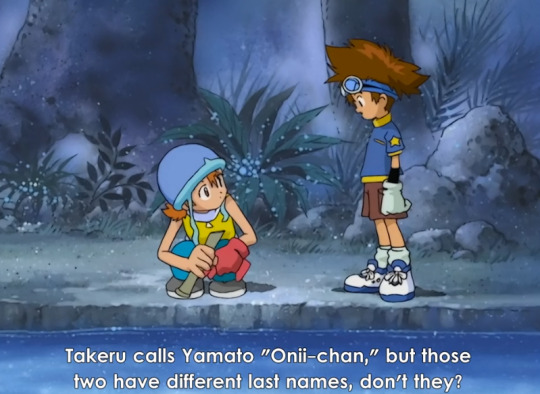
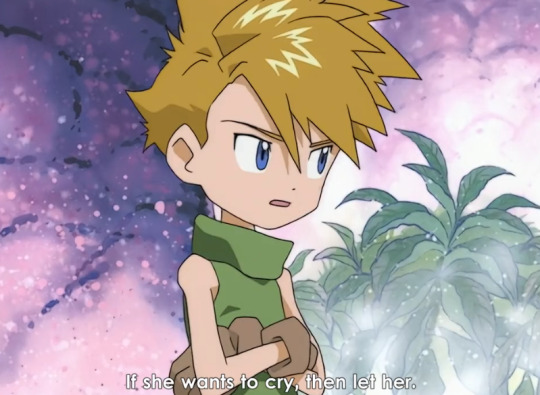
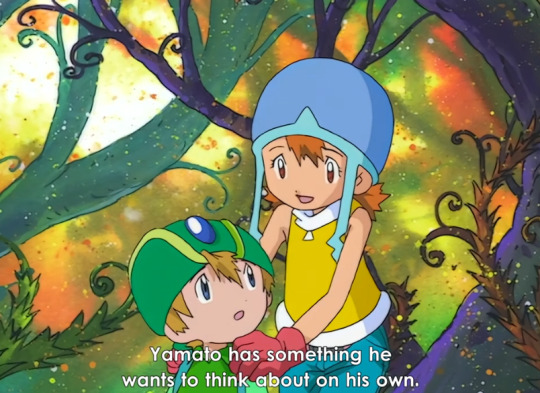
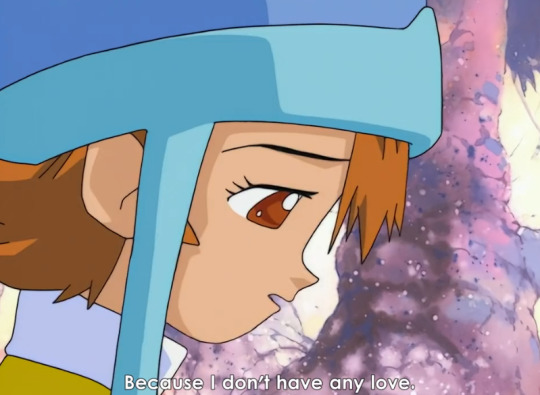
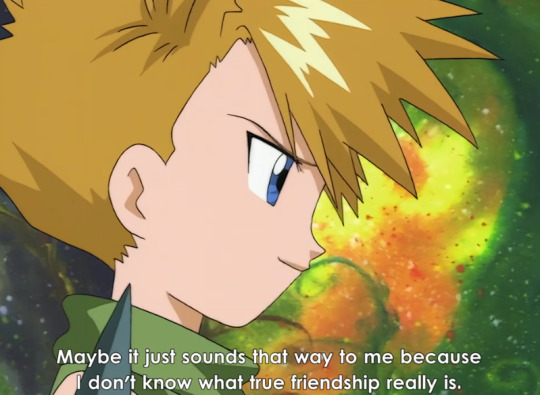

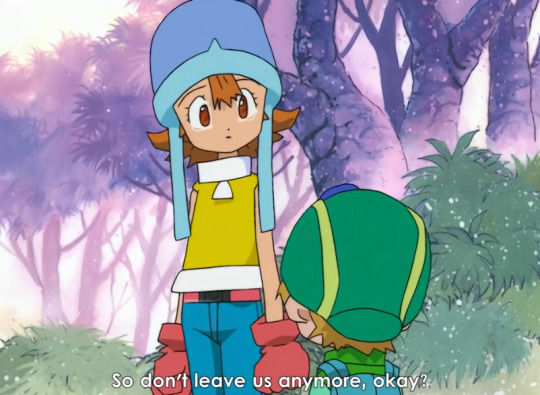

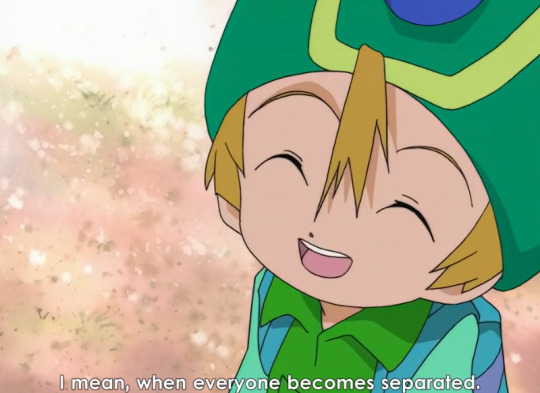
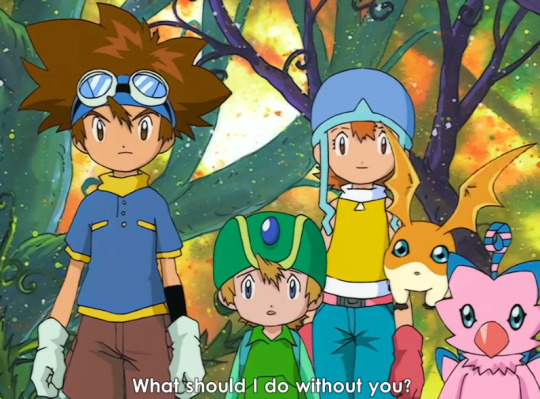
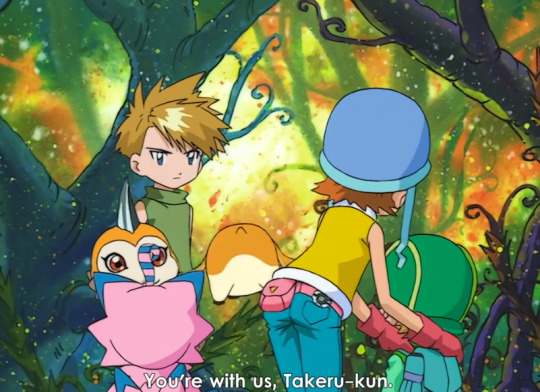


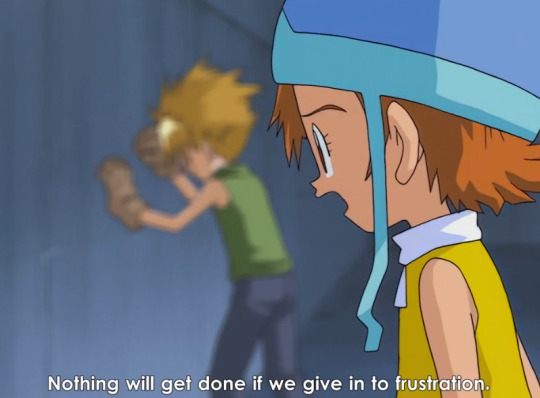
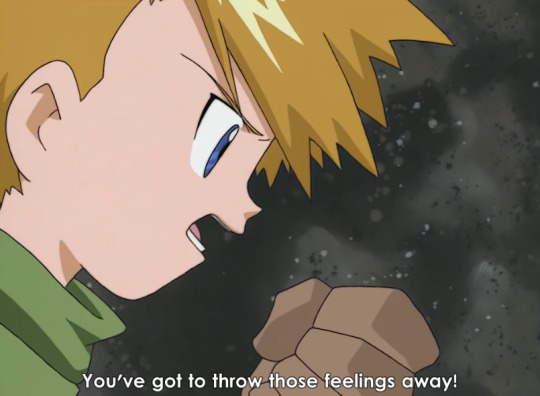
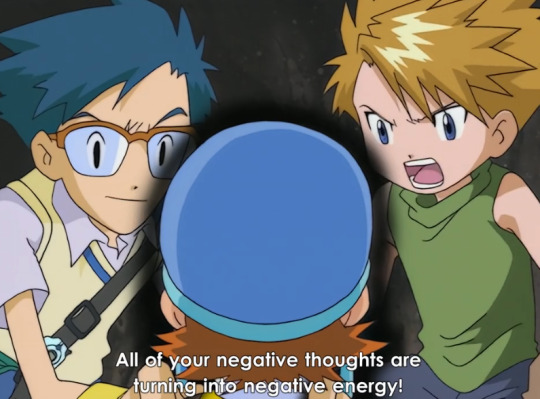
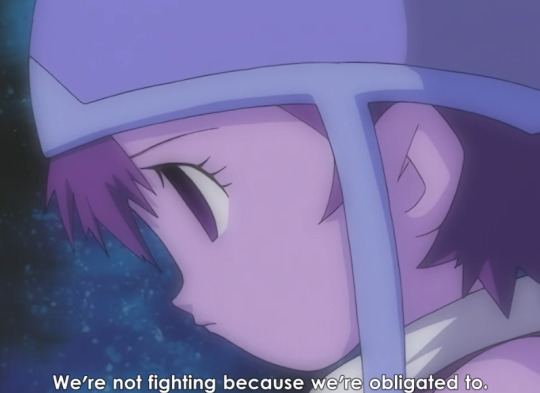
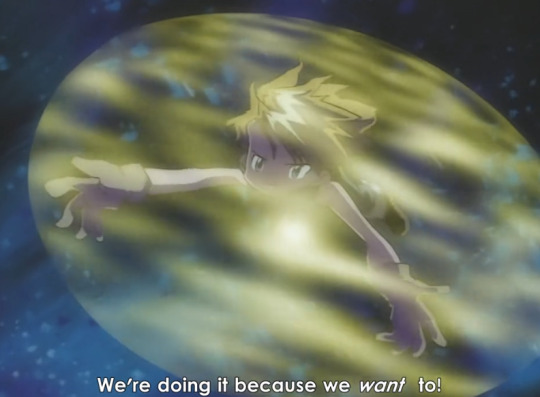

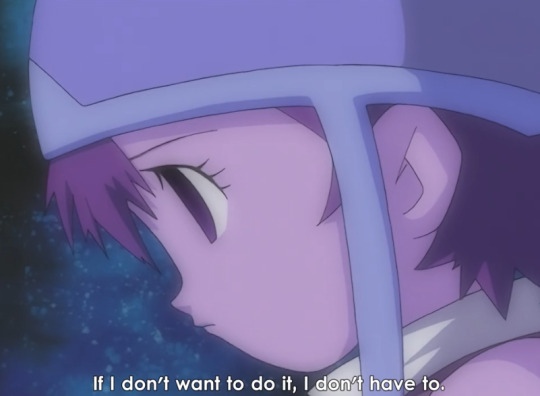
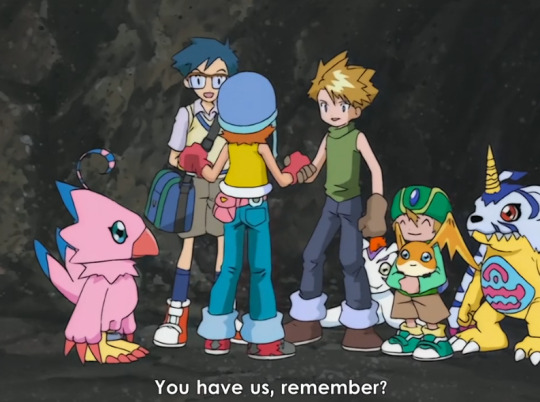
Digimon Adventure subtext analysis: The other family angle
Years ago, I had already tried to conduct an analysis on how Taichi, Hikari and Koushirou were set up in a way that displayed the importance of family within their bond [I, II, III]. The conclusion there was that, by closing his own family-related arc, Koushirou was capable of supporting Taichi and Hikari's (also indirectly family-related) struggles in the Dark Master's arc as well. In a very similar vain, it can be argued that Sora, Yamato and Takeru were set up similarly. The hypothesis here is that, by mirroring Sora's and Yamato's (and Takeru's) familial issues, they're capable of supporting each other in the final arc as well.
Let's see how these familial parallels and similarities play out:
While it can be argued that the majority of the characters keep their family-related trauma to themselves, in Sora's and Yamato's cases, it has the biggest effect on the group dynamic as a whole. Because while Taichi, for example, starts to get reckless in order NOT TO get reckless and protect everyone he loves, Sora's and Yamato's instinct is to pull away from everyone and everything to protect them, even if they may declare the opposite to be true. (Mind you, that is actually some kind of behaviour Taichi will adopt in Tri onwards as well, but that shall not be the point of this analysis.)
The most obvious parallel between them is that they have rather disruptive family lives. While Sora's parents aren't divorced, they're still not living together and her relationship to her mother is rather rocky, filled with misunderstandings based on expectations and different views on life. Yamato's and Takeru's parents are divorced and Yamato has a rather difficult time approaching his mother himself, telling her how he really feels about it all, etc. He tends to surround himself with an aura of coolness and aloofness, even though the viewer quickly learns that he is very emotional and is just trying to bottle it all up.
In the novels it is implied that Sora may have known that Yamato and Takeru were brothers from the very beginning - so her deflecting or not prying further into their lives at the start of the series, especially when Taichi and Koushirou are speculating about their relationship, makes sense. Because she understands that they need space.
And Yamato returns the favour later on, letting her cry it all out; when Sora is experiencing her outburst of emotions in her Crest episode, the viewer learns that she has been doing the same thing as Yamato: bottle it all up. In the same way, they are both prone to wanting to figure out how to deal with their "inner states" by themselves, they're both not particularly good at talking it all out - and so it shouldn't be surprising that they understand that aspect about the other and give each other time and space to breathe. It's not something everybody in the group understands, but it is a very distinctive parallel: Sora basically explains to them that she kept away from the group because she hadn't figured herself out yet. Thus, Sora explaining Takeru that Yamato needs time to do some soul-searching himself is a direct follow-up response here. She sensed Yamato's need to do this on his own and followed it up by the promise that Takeru would be safe in his absence.
Takeru is a good keyword at this point as well, because similarly to how Hikari was a focal point in the other analysis, he is the key factor that makes the family angle so apparent. Yamato may be the one to give Sora space - but Takeru is the one who tells Sora what she desperately needed to hear. He wants to keep the family together at all costs, he is fed up with separation scenes, so he doesn't want her to leave again, sees her as "family", wants her to know how valued and loved she is - and so, Sora is the one who reassures Takeru when Yamato is on the brink of leaving himself, believing that, eventually, everything will turn out fine. It may look like nothing more than repetitive behaviour at first - but it is a circle of learning and trust instead, to rekindle and have better family dynamics in the future.
It's due to their strained relationships with their parents, their masks, their coping mechanisms that Sora and Yamato think they don't have what it takes to activate or even deserve their respective Crests. Love and Friendship - they don't know what it means for them personally. It's why they're so prone to being engulfed by darkness, why their dark caves are dangerous manifestations of their declining mental health, self-doubt and fears.
That is why the soul-searching is needed, repeatedly so. It's why they understand each other's need to be left alone - which is something we will see throughout the entirety of the Adventure series for both of them. But it's also why they need Takeru's softness and Taichi's persistence (as well as Jyou's support and Mimi's reassurance at different times) to get it back together again. They have to be reminded that they don't HAVE TO be alone in all this (even if they often choose to).
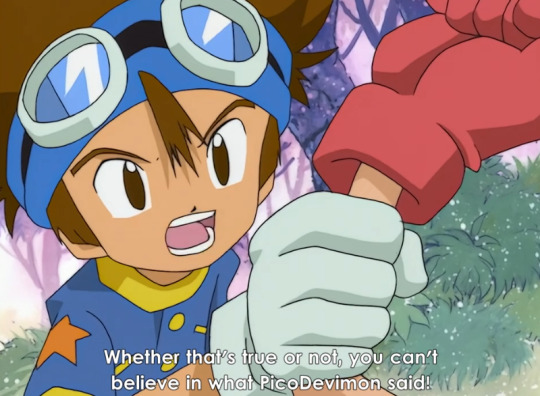

They know, deep down inside, that self-pity and giving in is not an option. They do ask themselves why they got into this situation, why they were chosen in the first place - but they also learn, through their experiences (and their respective bonds with and urge to support Taichi) that they're the ones who have the choice. To fight or to stay away - it's going to be their choice, again and again.
In the novels, the sight of Sora and Takeru together, right after he broke out of his own cave of darkness, even reminds Yamato of his mother, indicating that the entire journey is helping him to come to terms with slowly wanting to reconcile with her.
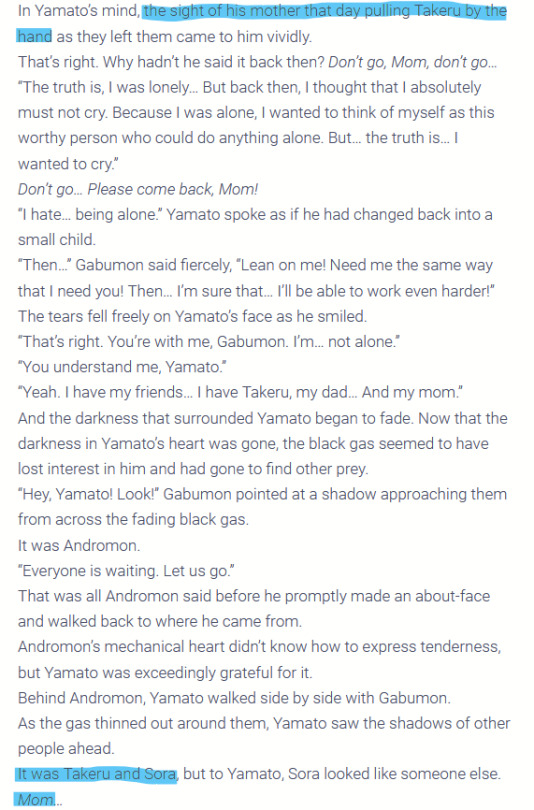
In general, Sora's role in the Dark Master's arc is mirrored by Koushirou's - they're support systems for the Yagami siblings (and Taichi and Yamato in combat), but Sora in particular is also often put together with the younger siblings, protecting them (enforcing her motherly role) or actually fighting alongside them (in more equal matters). In addition, she is acting as a bridge between the Takaishida brothers, especially in the final arc in which she is the one who throws Yamato's keychain at Takeru, thus helping him to overcome his own insecurities as well and eventually activating his Crest of Hope himself.
Long story short; Sora had already been on her way of reconciliation with her own mother and, after everything she went through, was able to reassure Yamato that he could go on to find his own path as she did hers before, believing that he could do it too. In return, Yamato had been put - and eventually also put himself - in the position to pull Sora out of her own state of darkness as well. Because he had been there himself, he was finally able to put things into words. Because, at this point in time, they're both incredibly similar - and may have gained what it takes to make up with their mothers.
11 notes
·
View notes
Text


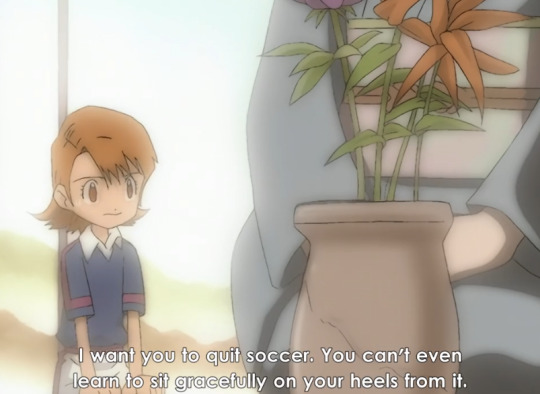
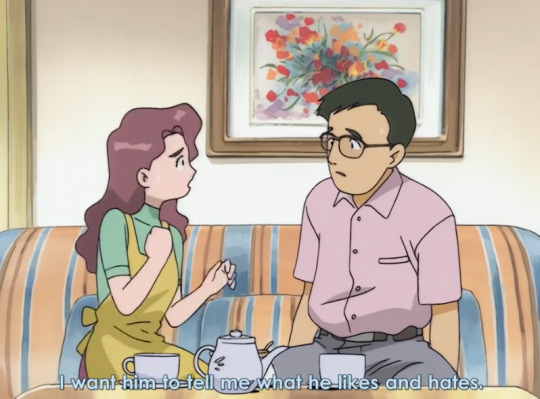
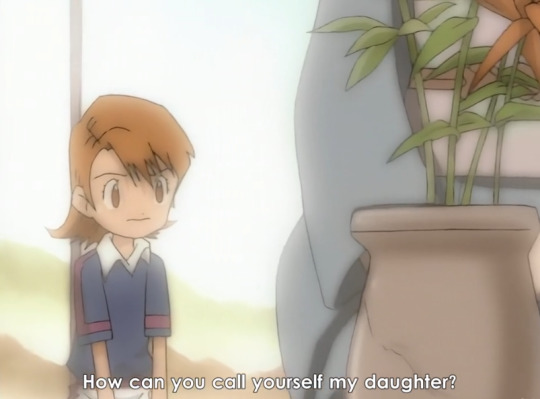
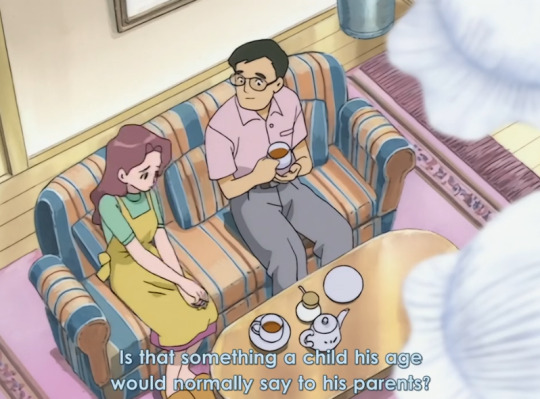
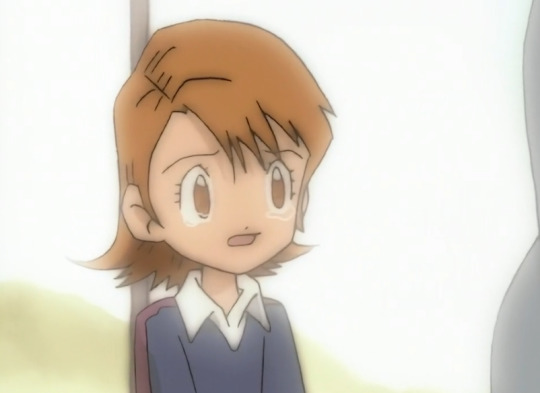
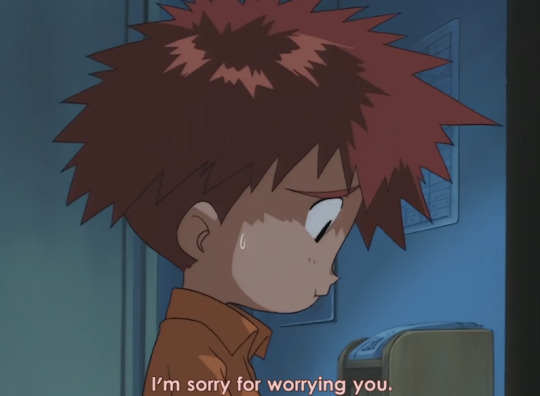
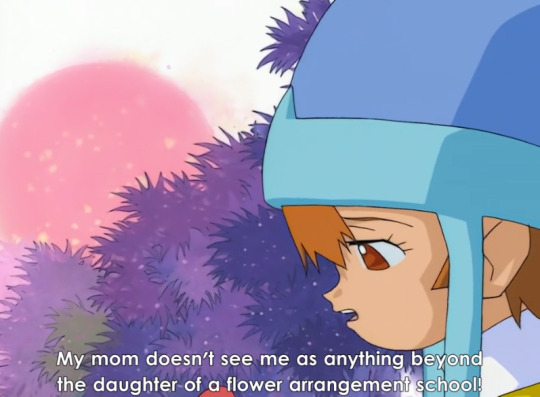

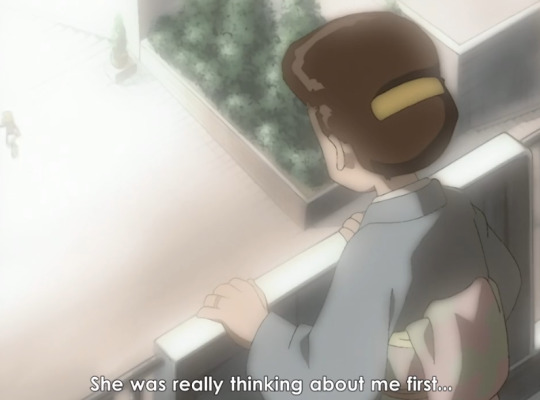

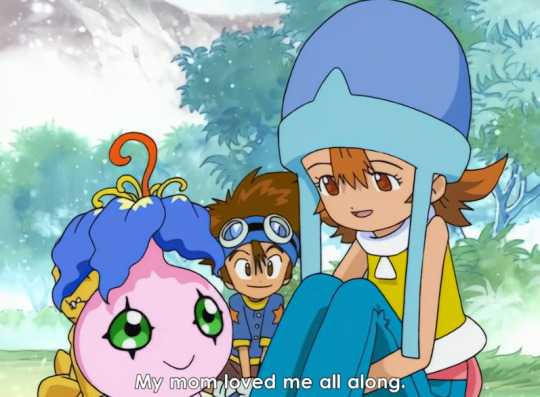
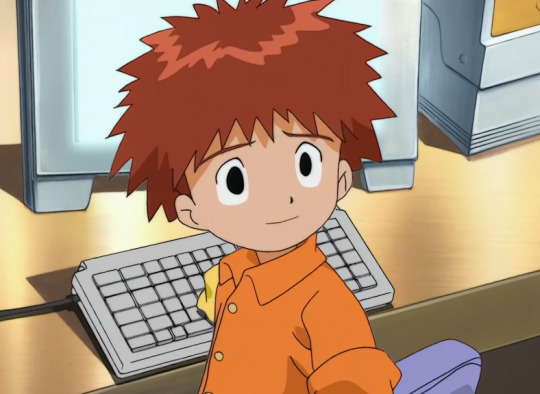
Going thoroughly insane over how on completely different ends Sora's and Koushirou's roles and relationships with their mothers (and in extension their parents in general) are portrayed in Adventure. And once again, it was ALL based on miscommunication:
Sora is perceived as the tradition-defying "tomboy" who is "loud" and plays football; Koushirou is perceived as the "good boy" who is always "polite and correct" and never acts spoilt or out of line. The key word here is "perceived", because we see both of them display traits in front of their peers that go beyond the "role" their parents witness (and that both of them are willingly or subconsciously displaying in front of them); Sora is actually the caring mom/big sister friend who literally and figuratively takes everyone under their wing, Koushirou is opinionated, forward and outspoken when things are dire and at stake.
Sora's mother wants her to act more like "the daughter of an ie-moto", more feminine, less out of line - at least, that is the message that reaches Sora, since her mother asks her to quit her beloved football. Her polite and aloof attitude appears to be rather cold and dismissive to Sora, which is basically what makes her rebel against the whole flower arrangement business. She feels unloved and misunderstood, as if she cannot be appreciated if she isn't "perfect" in her mother's eyes. Thus she is unable to understand that her mother may just worry about her hurting her injured leg even more. Furthermore, Sora has a very poor grasp on the fact that she herself is acting towards her friends and partner in the exact same way, albeit in a more gentle way most of the time.
Koushirou's mother wants him to be more selfish, to tell her what he dislikes and what bothers him, to stop being perfect at all times - but that is exactly what he physically cannot do, as he himself is doubting his whereabouts and simply tries to just shove all doubts and worries aside. Instead of acting "normal", he is hiding behind that barrier and mask of perfection towards his parents - and has to realize that this attitude is worrying them even more.
In the end, it all gets (mostly) resolved through them realizing that they're still loved regardless of what happened; they don't necessarily HAVE TO change, but it is up to them whether they want to or not. Meaning, their respective arcs of self-discovery have not ended yet, but the foundation for better relationships has been established here. Sora will start playing tennis (a.k.a changing her hobby) in an attempt to move towards her mother more, choosing to do so for her own sake. Koushirou will try to act more open and casual towards his parents, even though he is actively being reassured that his hobby (being into computers) is exactly what he is all about and that he doesn't have to change that.
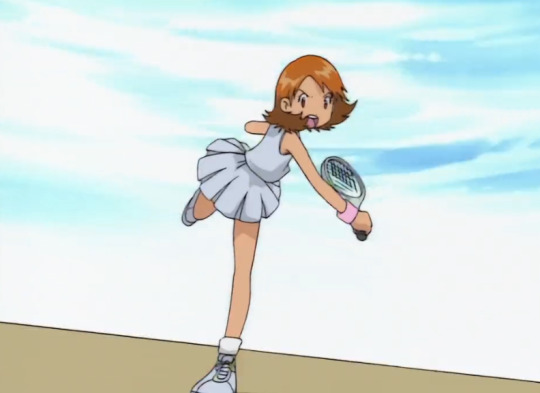
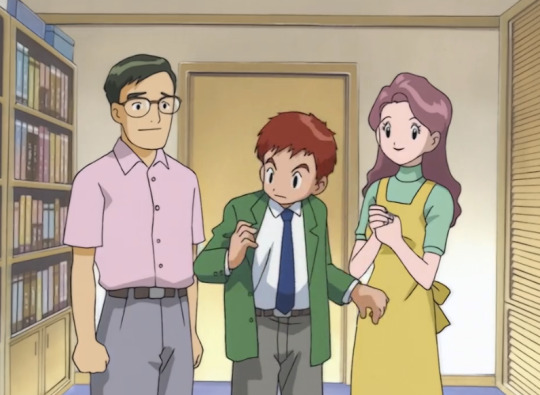
15 notes
·
View notes
Text

when ken meets ken
67 notes
·
View notes
Text

going insane over this
14 notes
·
View notes
Text
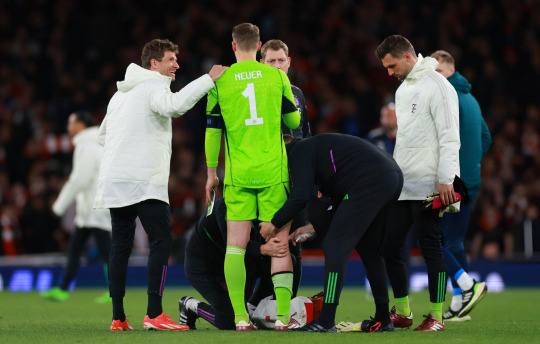

📸: Thomas Müller and Manuel Neuer at full time | FC Bayern München vs. Arsenal | 9.4.24
#can you see the LOVE in his eyes#neuller#manuel neuer#thomas müller#bayern#fc bayern#bayern münchen#queuetastic
75 notes
·
View notes
Text
友情 or 'Yūjō', meaning: Friendship
❕ Please do not repost to any other sites ❕
256 notes
·
View notes

